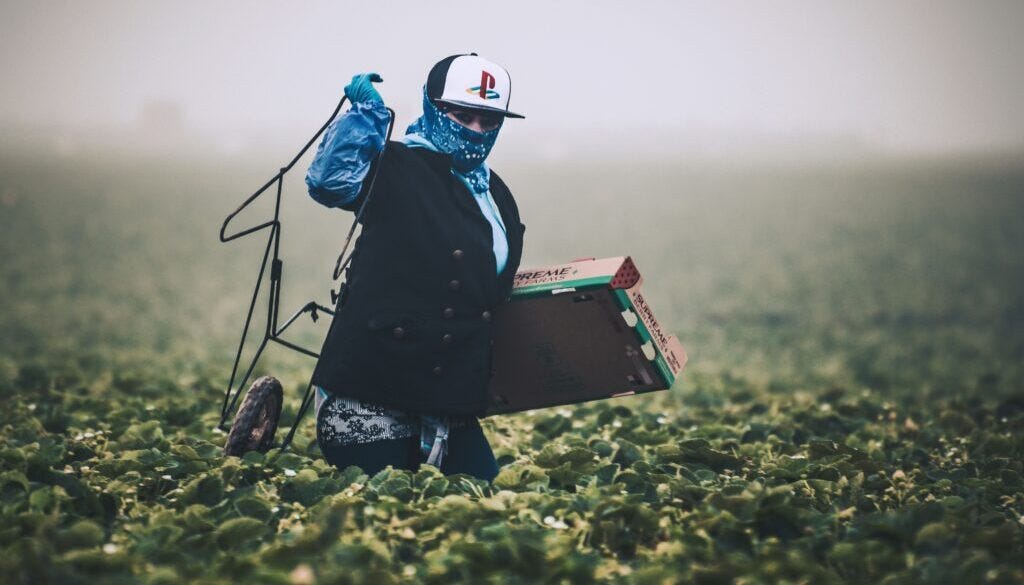Must-read recap: The New Lede's top stories
Deadline looms for CA airports to stop using PFAS firefighting foams; washing doesn't remove pesticide residues; bill to ban food dyes in schools; weed killer suspension; Big Oil is not dead yet.
Deadline looms for California airports to stop using PFAS firefighting foams
A majority of California airports known to be contaminated with toxic PFAS chemicals are continuing to rely on PFAS-laden foams for firefighting, despite a looming state deadline to phase out the foams due to the risks they pose to human and environmental health.
Only four out of 30 contaminated airports in the state have confirmed that they have stopped using foams containing per- and polyfluoroalkyl substances (PFAS) – also known as “forever chemicals” – and moved to a PFAS-free alternative. The majority are still struggling to transition, The New Lede has learned.
Though there is some indecision by state officials over the deadline for compliance, the airports could potentially face civil action against continued use of the PFAS-containing foams after September. (Read the rest of the story.)
Peel those apples: New study confirms washing doesn’t remove pesticide residues
(A version of this story was co-published with The Guardian)
A new scientific report lends weight to consumer concerns about pesticide residues on food, presenting fresh evidence that washing fruit before eating it does not remove various toxic chemicals commonly used in agriculture.
The paper, authored by Chinese researchers and published last week in the American Chemical Society’s journal Nano Letters, comes amid ongoing debate over the extent of pesticide contamination of food, and the potential health risks associated with a steady diet that includes residues of weed killing chemicals, insecticides and other farm chemicals.
In May, Consumer Reports said it had determined that 20% of 59 different fruit and vegetable categories carried pesticide residues at levels that posed “significant risks” to consumers, based on an analysis of data gathered by the US Department of Agriculture (USDA). (Read the rest of the story.)
California bill to ban food dyes in schools may have nationwide impact
A bill that would ban six food dyes linked to childhood learning problems from meals served at California public schools is close to passage and could bolster efforts to make foods safer across the US, according to proponents.
The measure has garnered strong bipartisan backing and is likely to reach the governor’s desk by the end of August, California Assemblymember Jesse Gabriel said at a press conference last week. Gabriel introduced the California School Food Safety Act (AB 2316) in March.
AB 2316 advanced through the Senate Health Committee last month and passed the California Senate Education Committee in June with a unanimous vote. The Senate Appropriations Committee is expected to decide this week whether to send it to the Senate Floor, according to Gabriel.
The dyes in question are used to give some beverages, desserts and cereals vibrant colors but don’t impact how the products taste. They account for two-thirds of the certified color additives the US Food and Drug Administration (FDA) has approved for use in food. (Read the rest of the story.)
EPA issues rare “emergency” suspension of dangerous weed killer
The US Environmental Protection Agency (EPA) on Aug. 6 said it was taking the rare step of issuing an “emergency suspension” of a chemical used to kill weeds on farms, golf courses and athletic fields, citing risks to unborn children.
The pesticide dimethyl tetrachloroterephthalate, known as DCPA or Dacthal, has been the subject of regulatory scrutiny for the last several years amid growing evidence of health harms from exposure.
“DCPA is so dangerous that it needs to be removed from the market immediately,” Michal Freedhoff, assistant administrator for the EPA Office of Chemical Safety and Pollution Prevention, said in a press statement. “It’s EPA’s job to protect people from exposure to dangerous chemicals. In this case, pregnant women who may never even know they were exposed could give birth to babies that experience irreversible lifelong health problems.”
Freedhoff said the suspension marks the first time in almost 40 years that the agency has used its emergency suspension authority to block continued use of a pesticide. (Read the rest of the story.)
Postcard from California: Big Oil is not dead yet
(Opinion columns published in The New Lede represent the views of the individual(s) authoring the columns and not necessarily the perspectives of TNL editors.)
As California advances toward its goal of virtually eliminating the use of fossil fuels in 20 years, the state has dealt the oil and gas industry a barrage of body blows.
Four years ago, Gov. Gavin Newsom ordered a ban on the sale of new gasoline-powered cars and trucks starting in 2036, while diesel-powered freight trucks will be outlawed by 2042. A 2022 law banned new oil and gas drilling near homes, schools and hospitals, and Newsom has directed regulators to end to all drilling in the state by 2045.
Last year, California also established a watchdog agency to monitor the state’s petroleum industry for alleged price-gouging at the pump, among other consumer protection provisions. And State Attorney General Rob Bonta filed a sweeping lawsuit against five of the world’s biggest oil companies for their decades-long coverup of the climate impact of burning fossil fuels.
The industry whines that the Newsom administration wants to put it out of business, and headlines declare that it faces the “end of the road” in California.
But Big Oil is not dead yet. (Read the rest of the opinion column.)








Thank you for the summary and link to the full article on ending the use of PFAS containing AFFF at airports in California. The linked article includes links to the State of California Department of Water Resources , Water Resources Control Board site monitoring data base (user friendly map searching) of drinking water wells and potential contaminate discharge points throughout the state (although I did note some glaring omissions of naval air stations where AFFF is used). Also noteworthy is U.S. Representative Salud Carbajal’s (CA-24, San Luis Obispo) bipartisan bill Pollution-Free Aviation Sites (PFAS) Act, signed into law by President Biden on May 16, 2024. The legislation is endorsed by “airport-focused and firefighter safety organizations such as the International Association of Fire Fighters, Airports Council International — North America, the California Airports Council, and the Environmental Working Group.” Good news that got little to no press coverage.
In the 1970s Dr Feingold at Kaiser hospital in South San Francisco had a list for mothers whose children were intolerant of food additives and colorings. This is old, old, old news. Dr. Feingold is gone, but his website lives on.